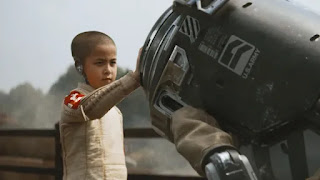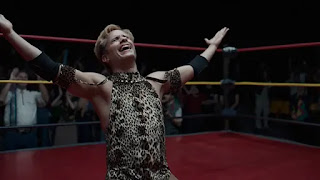I rooted for The Creator, hoping this latest futuristic extravaganza would be a major addition to the big-screen sci-fi canon. Although the movie comes close, it ultimately falls short.
The subject -- a war between humans and AI -- couldn't be more topical but director Gareth Edwards (Godzilla, Rogue One: A Star Wars Story) gives his two-hour and 15-minute adventure a bric-a-brac feel that keeps the movie from gathering force.
Edwards's movie evokes memories of bygone sci-fi -- notably AI: Artificial Intelligence (2001) and The Terminator (2024). You also may find yourself thinking about a variety of Vietnam movies that showed Asian populations being decimated by American military might.
That's because much of the story takes place in the fictional location of New Asia, the place where special forces warrior Joshua (John David Washington) is sent to forestall the extinction of humanity.
The story begins with a jumble of action set in 2065, ten years after Los Angeles was destroyed by nukes, a catastrophic attack attributed to the AI on which humans had become too dependent. The US has outlawed AI, vowing never to let it strike again.
Early on, we meet special forces warrior Washington's Joshua. A needless raid by the US military blows Joshua's cover during a spy mission in New Asia. During the melee, Joshua's pregnant wife Mia (Gemma Chan) is killed.
Joshua was supposed to coax Mia into revealing the location of Nirmata. a creator with that the power to program AI for maximum destruction. Still, Joshua loved her and thought he could work to benefit both humans and AI.
The US's imperialist objectives are anything but subtle. The US military operates NOMAD, a Flying Fortress that hovers over the earth beaming destructive rays on designated targets.
Leave it to humans. When encountering a force with superior intellect, the response: Blow it up.
General Andrews (Ralph Ineson), a one-note hard ass of a military man, presides over NOMAD. Allison Janey portrays Colonel Howell, an officer who tries to be more sympathetic toward the mistrustful Joshua.
As if to signal a theme, Joshua comes equipped with prosthetic robotic limbs acquired after suffering terrible war wounds. He's part robot, suggesting that a blend of AI and humanity might be possible.
New Asia is enemy turf, but wait. Why are some bots in New Asia wearing Buddhist robes and acting as if they've mastered the art of cosmic serenity? Why do they have spinning gears in the back of their heads?
These bots, by the way, have human skin -- or a simulated version of it -- and digital parts. Same goes for an achingly cute six-year-old girl Joshua dubs Alphie (Madeleine Yuna Voyles). Alphie has powers that she's only learning to harness.
To complicate matters, she might be the very creation that Joshua has been ordered to kill.
A scattered story includes a predictable twist, concluding with a mega blast of emotion built around sacrifice and hope. Some may be moved but I didn't know whether to be inspired or go with the one-word question I wrote in my notebook, “risible?”
I presume you know which way I leaned.
We've seen worse movies than The Creator and Edwards deserves credit for creating an immersive look and nailing an intriguing final shot. But The Creator seldom scales the heights of imaginative writing that could have matched its visual accomplishments and outsized ambitions.










